PayPal Scams: How to Spot and Stop Fraud in Its Tracks?

Bisma Farrukh
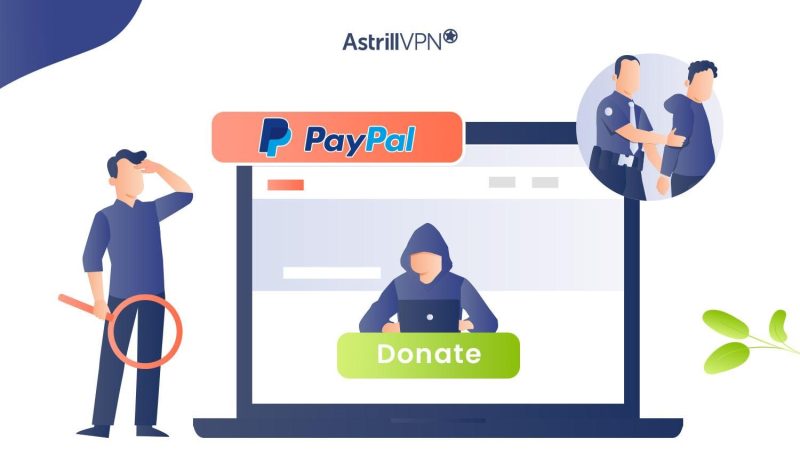
You’ve probably heard of PayPal scams before. Maybe you’ve even been targeted by a few. As convenient as PayPal is for sending and receiving money, it’s also become a favorite tool for scammers and fraudsters to trick people out of their hard-earned cash. With a little vigilance and know-how, you can spot PayPal scams coming a mile away and stop fraud in its tracks. In this article, you’ll learn the common signs of PayPal fraud to watch out for, how scammers try to trick you, and the steps you need to take right away if someone gains access to your account.
Table of Contents
What is a PayPal scam?
A PayPal scam is when fraudsters try to trick you into giving them money or account access. They may send phishing emails, texts, or call pretending to be from PayPal.
Watch out for messages claiming there’s a problem with your account or a suspicious login. PayPal will not ask for sensitive info like your password, social security number, or bank account details. Some scams offer money for nothing, like unclaimed funds or a cash prize. If it’s too good to be true, it’s a scam. PayPal does not do giveaways or lotteries.
Be wary of sob stories or requests to wire money to a friend or family member in need. Never send money to someone you don’t personally know and trust. The safest way to use PayPal is to log in directly on paypal.com. Check statements regularly and report anything suspicious to PayPal immediately.
Recent Paypal scams
As of recent reports, PayPal scams have become increasingly prevalent. Here are some notable statistics and details:
1. In 2023, PayPal users reported a significant rise in scams, with incidents rising by approximately 30% compared to the previous year.
2. According to a report from the Federal Trade Commission (FTC), consumers lost around $400 million to various online payment scams in 2023, with PayPal scams contributing to a notable portion of these losses.
3. PayPal reported handling over 50,000 scam-related complaints in the first half of 2024 alone, highlighting the ongoing issue.
4. In 2023, phishing attacks targeting PayPal users increased by 25%. Attackers gain access to user accounts through stolen credentials, often from data breaches on other platforms. The number of account takeovers reported in 2023 surged by 40% compared to 2022.
5. Scammers impersonate PayPal’s customer service, claiming to process refunds or chargebacks. Users end up revealing sensitive information or making payments to fraudsters. This scam type increased by 15% in 2023.
To protect yourself, always verify the authenticity of communications and be cautious about sharing personal or financial information online.
Can you get scammed on PayPal?
Unfortunately, yes. PayPal scams are common, so you’ll want to stay vigilant.
- First, watch out for phishing emails claiming a problem with your account. Legitimate companies like PayPal will not ask for sensitive data like your password or social security number over email.
- Second, be wary of unsolicited messages offering free money or gifts. If something sounds too good to be true, it probably is. These scams often aim to trick you into paying “fees” or “taxes” to claim a fake prize.
- Finally, only buy from or sell to people you know and trust. Scammers frequently create fake listings for goods or services that don’t exist in order to steal your payment info. They may also claim the item was never delivered to get a refund from PayPal and keep your money.
How to Protect Yourself From PayPal Scams
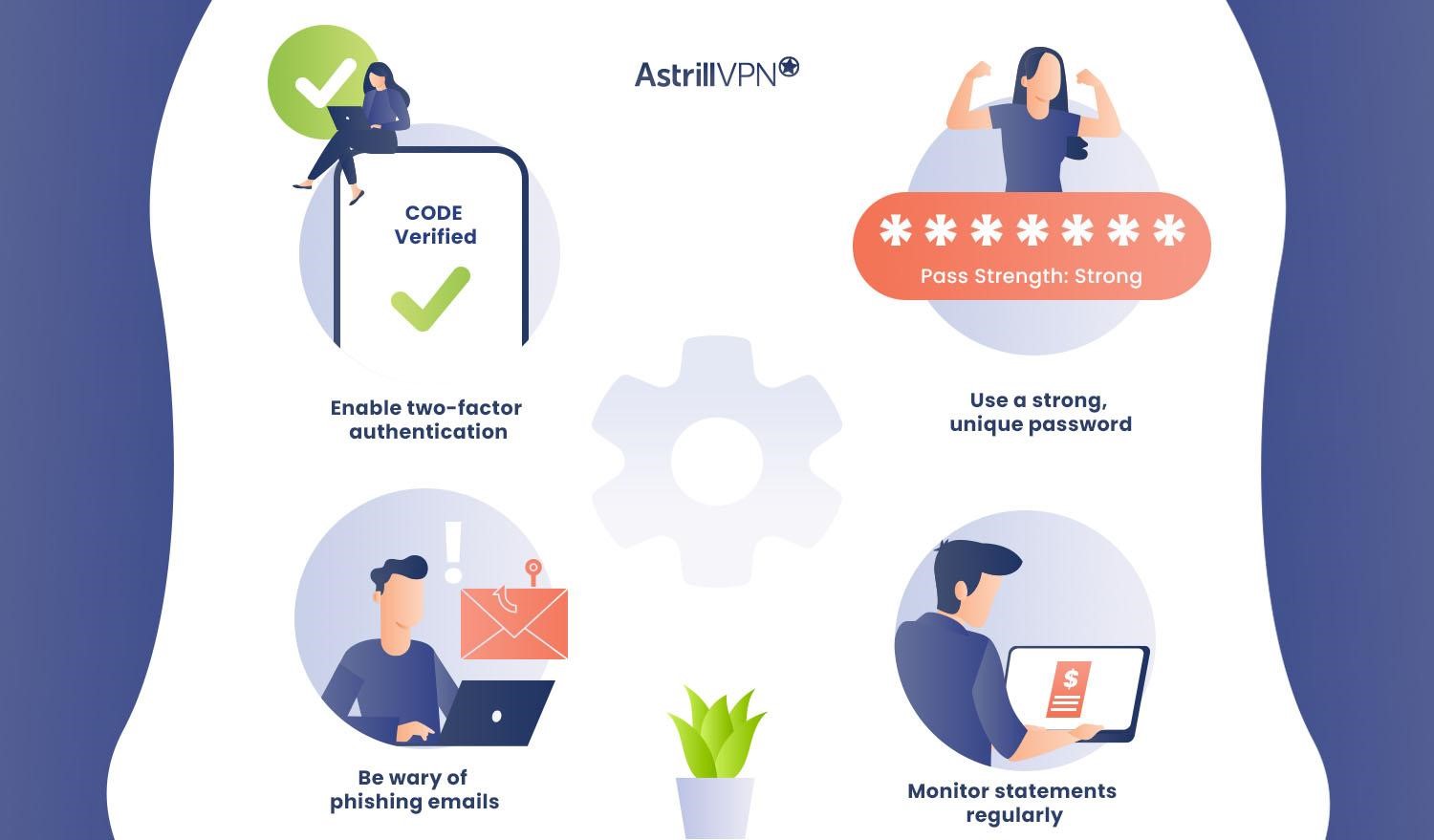
While PayPal is generally very secure, there are still risks of your account being targeted by scammers and fraudsters. The good news is there are steps you can take to reduce your vulnerability.
Enable two-factor authentication
Two-factor authentication, like a text message code, adds an extra layer of protection for your login. With this enabled, anyone trying to log in to your account will need not only your password but also the code sent to your phone. This makes it much harder for hackers to access your account.
Use a strong, unique password
A weak or reused password is an open invitation to hackers. Choose a password with at least 12 characters, a mix of letters, numbers, and symbols. And don’t reuse the same password across websites. If a hacker obtains it from one site, they can then access all your other accounts.
Be wary of phishing emails
Phishing emails are designed to trick you into entering your login details or downloading malware. Never click links or download attachments from unsolicited messages. And never enter your PayPal login details on any site other than paypal.com.
Monitor statements regularly
Check your PayPal statements frequently for any unauthorized charges or withdrawals. The sooner fraud is detected, the sooner you can take action to limit the damage. Report anything suspicious to PayPal right away.
Is there a Paypal scam going around?
Unfortunately, yes. PayPal scams are common, so you’ll want to be on alert. Scammers often send phishing emails posing as PayPal to trick victims into providing their account login info or sending money.
Phishing emails
Nowadays, Legit emails from PayPal will address you by name and provide an official PayPal logo and font. Phishing emails typically have poor grammar, threatening language demanding quick action, and links leading to spoof sites. Never click links or download attachments from suspicious messages.
Instead, log into your PayPal account directly and check for any issues. If everything looks normal, report the phishing email to PayPal and delete it. Staying vigilant and verifying the legitimacy of messages before taking action can help prevent you from becoming a fraud victim.
How AstrillVPN can protect you from Paypal scam?
AstrillVPN can help protect you from PayPal scams in a few ways:
Secure your connection
Using a VPN like AstrillVPN encrypts your internet connection and hides your online activities. This makes it much harder for scammers to steal your PayPal login info on your device. The encryption acts as a shield around your data.
Change your virtual location
AstrillVPN allows you to connect to servers in different countries. Scammers often target users in certain locations, so changing your virtual location by masking IP address can reduce your risk. Connecting to a server in the US or Europe, for example, may be safer than connecting directly in some Asian or African countries that scammers frequently target.
Block suspicious websites
AstrillVPN includes a firewall that can block malicious websites known for fraud and scams. This makes it less likely you’ll accidentally visit a bogus PayPal phishing site or download a scam email attachment containing viruses. The firewall runs in the background to help protect you even when you don’t realize a website might be suspicious.
Using a reputable VPN service like AstrillVPN, in combination with strong passwords and two-factor authentication on your PayPal account, will significantly improve your protection from the constant threats of PayPal fraud. Think of it as an extra shield for your online security.
Common PayPal Scams to Watch Out For
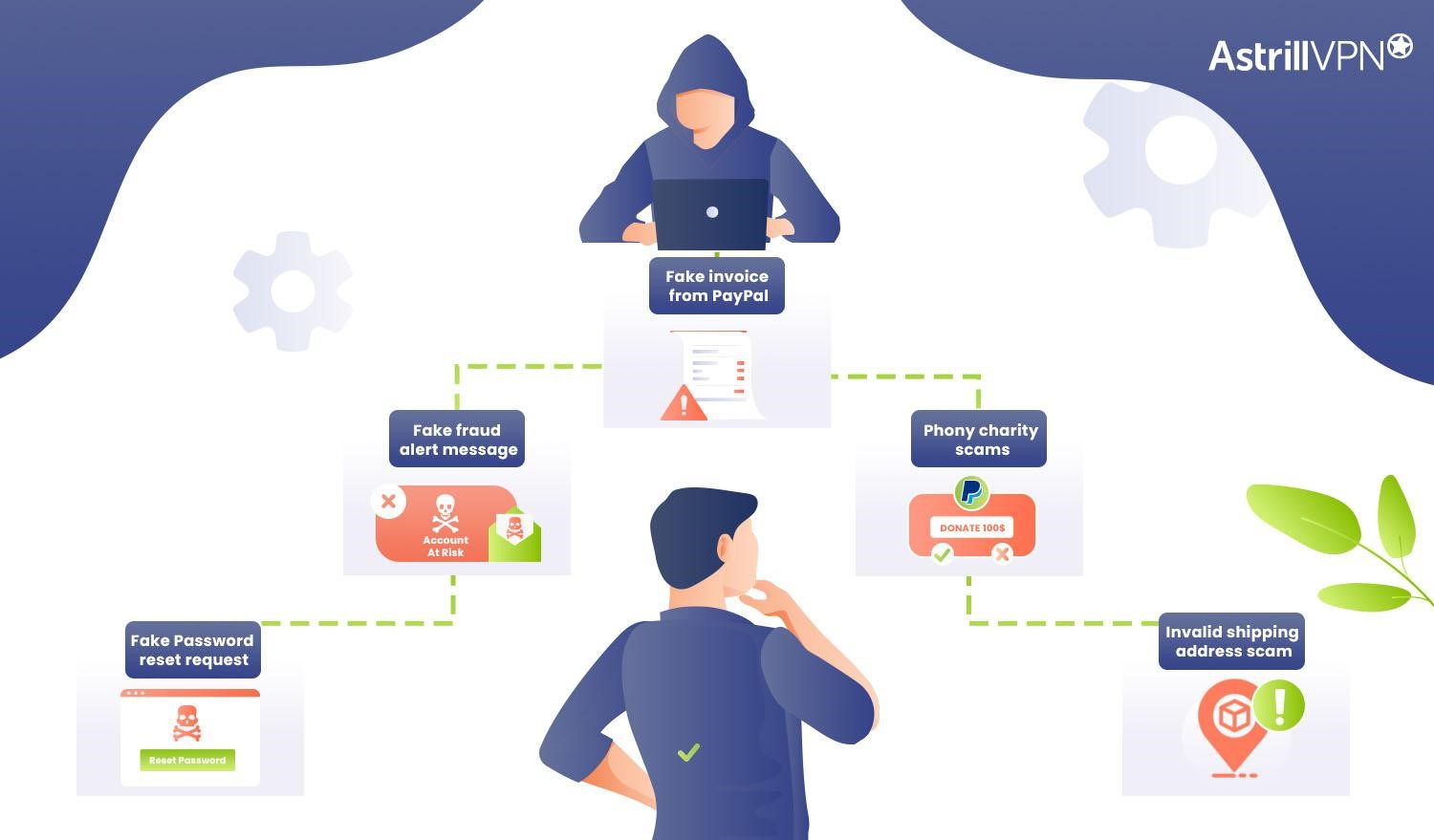
These are some common PayPal scams that have been listed here. Fraudsters often send:
- Fake invoice from PayPal: This looks like a bill for services you didn’t purchase. PayPal will not send unsolicited invoices. Delete it.
- Fake Password reset request: Legitimate companies like PayPal will not ask for sensitive info like passwords via email. Never click links or provide data in unsolicited messages.
- Fake fraud alert message: Scammers pretend your account is compromised to trick you into providing account access. PayPal will not request account info by email.
- Invalid shipping address scam: Fraudsters claim a product was shipped to the wrong address to get you to provide an alternative address or payment info. Legit companies verify addresses before shipping.
- Phony charity scams: Fake donation requests using PayPal’s name and branding to appear legit. PayPal does not solicit donations this way.
How Criminals Try to Hack Your PayPal Account?
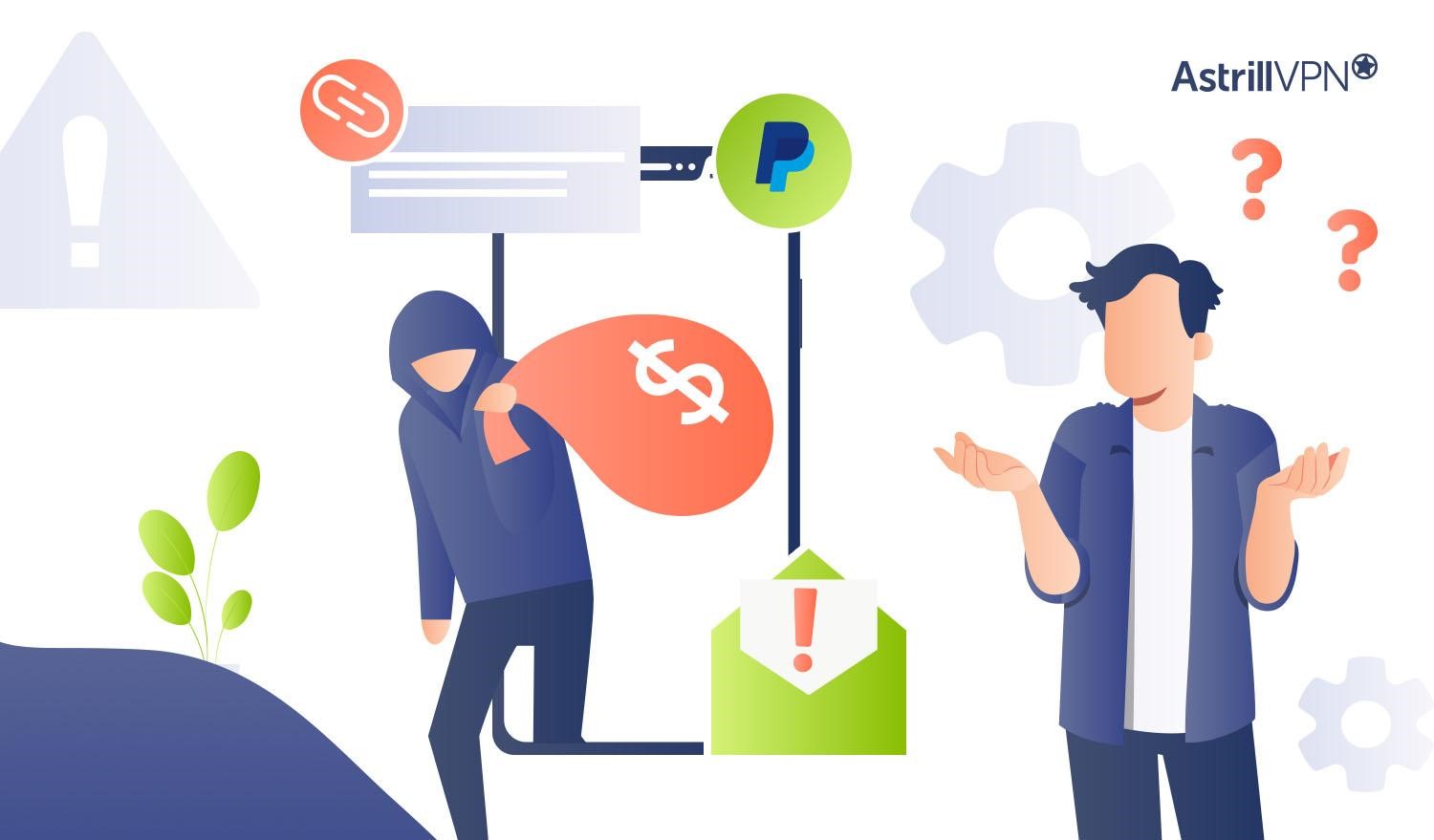
PayPal scammers use clever tricks to access your account. Be on alert for:
- Phishing emails claiming there’s a problem with your account. Never click links or download attachments from unsolicited messages. PayPal will not ask for sensitive data like your password or social security number via email.
- Fake websites mimicking PayPal’s login page to steal your credentials. Double check the URL to ensure it’s paypal.com before entering your info.
- Keylogging software installed on public computers to record what you type. Only access PayPal on your personal devices.
- SIM swapping to gain control of your phone number. Use two-factor authentication on your PayPal account and enable a PIN on your mobile carrier account.
- Brute force attacks try common passwords to guess their way in. Choose a strong, unique password with a minimum of 12 characters, numbers, and symbols.
- Social engineering where scammers manipulate people into sharing account access. Never share your password or authentication codes with anyone.
Beware of PayPal Phishing Emails and Links
Phishing emails and malicious links are a common way for scammers to steal your PayPal login info or installing malware. Be extremely wary of unsolicited messages claiming there’s a problem with your account or a payment issue that requires your immediate attention.
- PayPal will not ask for sensitive data like your password, social security number or bank account details through email. Delete any messages that do. Phishing emails often contain poor grammar and spelling, or greet you as “Dear Customer” rather than using your name.
- Never click links or download attachments from unverified or suspicious senders. Even if an email looks legit, hover over hyperlinks to view the actual destination URL. Fraudulent links may go to spoof sites designed to steal your login credentials.
- When in doubt, log in to your PayPal account directly and check for any notifications. You can also forward suspicious emails to spoof@paypal.com. PayPal monitors this inbox closely and can confirm if a message is fraudulent or authentic.
Can someone hack your PayPal?
If you fall victim to a PayPal scam, take action immediately.
Report it
Report the scam to PayPal within 48 hours. Provide details about the transaction and any communication with the scammer. PayPal may be able to prevent further fraud and recover your funds. They can also alert other potential victims.
Contact your bank
Call your bank to dispute any unauthorized charges. Explain that it was fraud, and ask them to reverse the transaction and refund your money. The sooner you contact them, the better.
Review statements
Closely review statements and transactions for anything suspicious. Scammers may have accessed more information or tried other scams. Place fraud alerts or freeze credit with credit bureaus to lock access.
Be wary of follow-up fraud
Watch out for “recovery” scams where a fraudster poses as PayPal or a bank, claiming they can recover stolen funds for an upfront fee. Legitimate companies do not ask for money to recover scam losses.
Learn from it
Unfortunately, once money has been sent via PayPal as part of a scam, it is rarely recoverable. Use it as an opportunity to learn how to better spot and avoid PayPal fraud in the future. Never send money to anyone you don’t know and trust.
Can you get refund after getting scammed on PayPal?
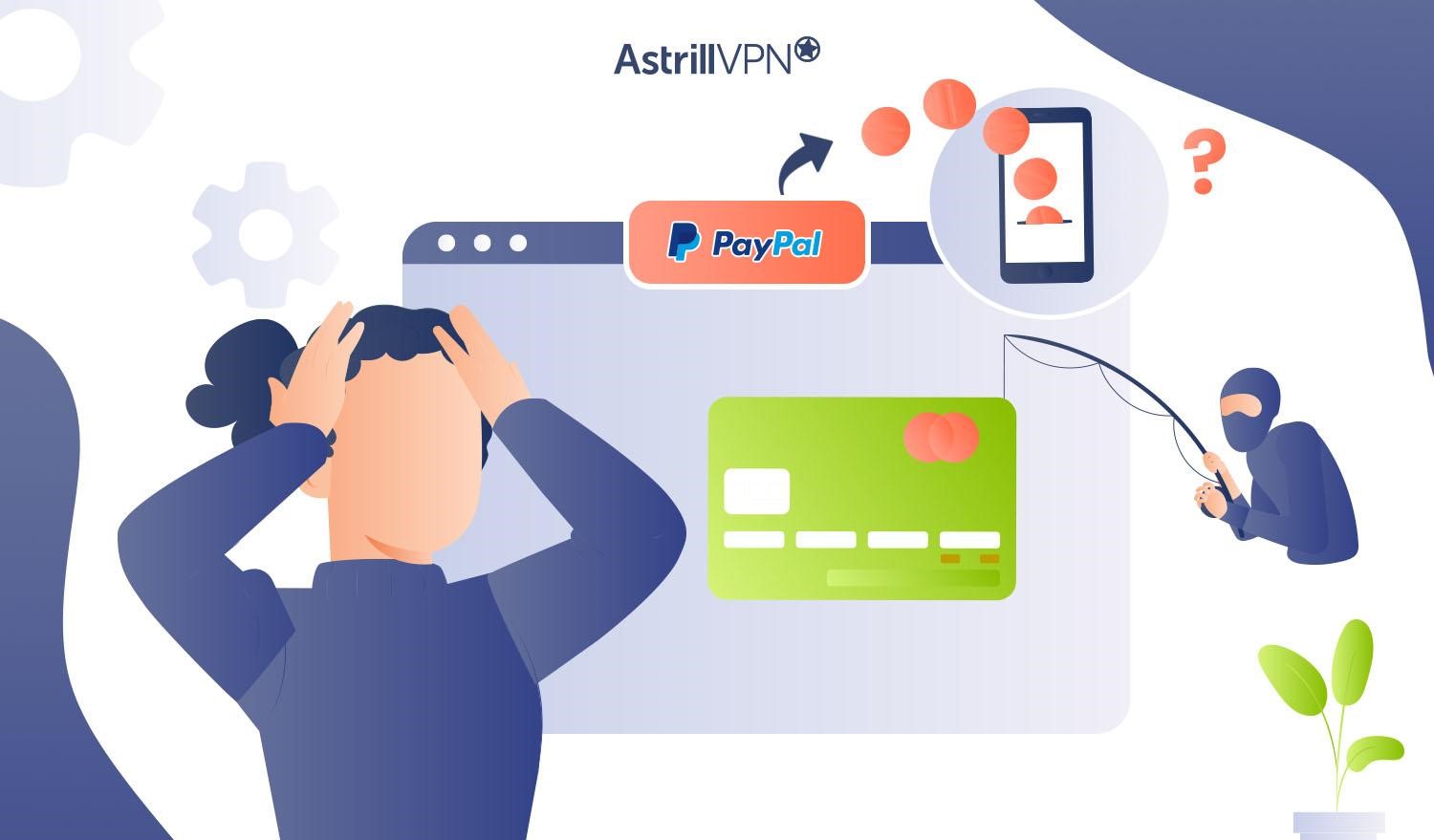
Unfortunately, once a PayPal scam transaction has gone through, it can be difficult to recover your funds. However, in some cases, you may be eligible for a refund.
Filing a Dispute
If you report the unauthorized transaction within 60 days of the charge appearing on your PayPal statement, you may be able file a dispute to try and recover the funds. You will have to provide details about the scam to support your claim. PayPal will investigate and determine if a refund is warranted.
The sooner you spot the scam charge and file a dispute, the better your chances are of recovering your money. Carefully monitor your PayPal account regularly for any unauthorized activity. If you do become a victim of fraud, take action right away. The faster you alert PayPal to the scam, the faster they can work to recover your funds before the scammer withdraws the money.
While PayPal aims to prevent fraud whenever possible, scams still happen. By taking proactive steps like enabling two-factor authentication on your account, using unique passwords, and inspecting statements regularly, you can help reduce your risk. And if a scam still slips through, filing a quick dispute gives you the best shot at getting your money back.
FAQs
Unfortunately, once a payment has been processed through PayPal, it typically can’t be reversed. However, in some cases you may be able to dispute an unauthorized transaction or item not received. You’ll need to report the issue to PayPal as soon as possible.
Scammers can potentially withdraw money from a compromised PayPal account. To avoid fraud, enable two-factor authentication on your PayPal account, use unique passwords, and be wary of phishing emails asking for sensitive info like your password or credit card number. PayPal employs advanced security systems to help detect suspicious activity, but users must also remain vigilant.
Using PayPal to send or receive money from people you don’t know and trust can be risky. Scammers often target PayPal users to steal money or account access. When dealing with strangers, be extremely cautious. Never provide sensitive account info or click suspicious links.
Conclusion
You now have the knowledge to spot PayPal scams before they strike. Stay vigilant, trust your instincts, and never click links or download attachments from unverified senders. If something seems off about an email or message, it probably is. Don’t engage with the scammer or provide any personal information. Simply delete the message and report anything suspicious to PayPal’s security team. While fraudsters get more advanced, an aware and informed user is still their greatest threat. You have the power to stop scams in their tracks and keep your account secure.

No comments were posted yet